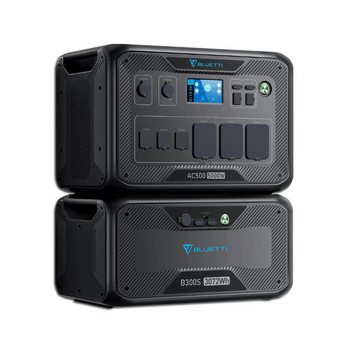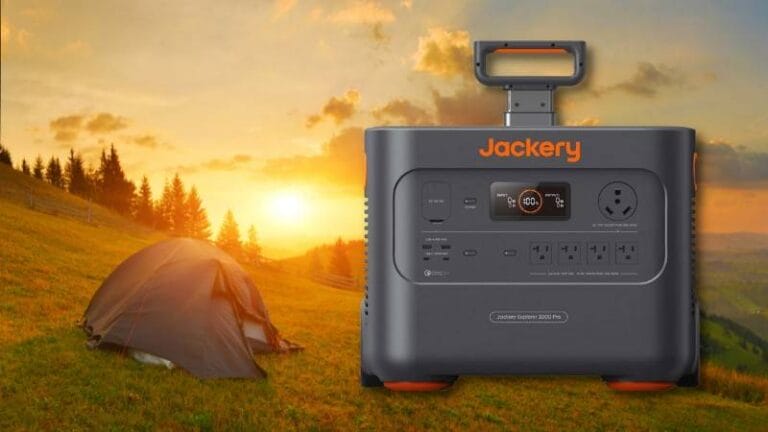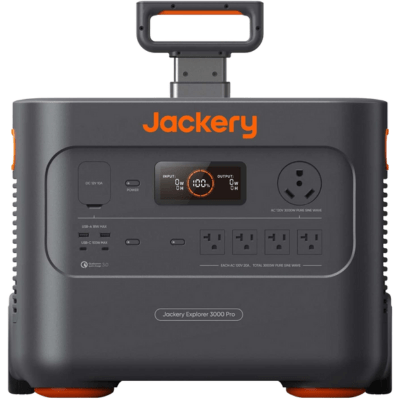A few years ago, owning a portable generator meant you were either a hardcore camper or prepping for the occasional blackout. But today? Between rolling blackouts, extreme weather, and an unreliable grid, portable power has gone from “nice-to-have” to absolute necessity.
Gas generators are loud, messy, and anything but eco-friendly — and that’s where solar generators have stepped in. They’re clean, quiet, and increasingly powerful. And Jackery, one of the biggest names in the game, has just raised the bar with its most advanced power station yet: the Jackery 3000 Pro.
This solar-compatible beast packs serious capacity, supports heavy-duty appliances, and can even deliver an emergency top-up for your EV. It’s built for real-world problems — whether you’re powering a mobile home, running an off-grid cabin, or riding out a multi-day blackout in peace.
But with the price tag creeping into whole-home backup territory, the real question is: Does the Jackery 3000 Pro actually deliver? Or is it a premium power station that’s already been outclassed by the competition?
Let’s break it down — specs, use cases, brand philosophy, and how it compares to the likes of Bluetti and EcoFlow.
Jackery’s Sustainability Vision: From Campgrounds to Crisis-Ready Power
Jackery has always marketed itself as a brand built for the outdoors — quiet, clean, and solar-first. But with the Jackery 3000 Pro, it’s clear they’ve stepped beyond trailheads and tents into something far more ambitious: resilient, eco-conscious energy for homes, mobile workspaces, and life off-grid.
Founded in 2012 by a former Apple engineer, Jackery set out to create accessible, solar-ready power stations that could eliminate the need for gas. That early mission still holds true today, but now the stakes are higher — and the capacity is, too.
With larger batteries, faster charging, and growing support for emergency backup systems and EV charging, Jackery’s latest models are more than just eco-toys. They’re positioned as real solutions to power insecurity, extreme weather, and the increasing demand for clean alternatives to fossil-fuel generators.
The brand continues to promote environmental awareness through campaigns like “Solar Way Forward” and partnerships with organizations like the National Forest Foundation, but when it comes to long-term sustainability, Jackery still has ground to cover. Most of its models — including the 3000 Pro — rely on NMC lithium battery cells, which have fewer charge cycles compared to longer-lasting LFP (LiFePO4) technology now used by competitors. And while their products are built to last, there’s no official recycling, trade-in, or battery takeback program in place — yet.
Still, when you compare the Jackery 3000 Pro to a gas generator, the benefits are clear: no fumes, no fuel, no noise. Just plug in a few solar panels and you’ve got clean, self-sustaining power wherever you need it.
Jackery 3000 Pro Specs Analysis — What They Mean in Real Life
When you hear 3,024 Wh battery capacity, that translates into some serious runtime. Let’s break down what it can actually do.
For example, it can power a standard refrigerator (about 500 W) for roughly 5–6 hours straight — that’s enough to keep your food cold during a midday outage or all night during a blackout. If you have essential medical gear, the runtime gets even more impressive: a CPAP machine (40 W) could stay on for over 60 hours, ensuring continuity of care when the grid fails.
Got a busy RV with air conditioning? This power station boasts a continuous 3,000 W output (with a 6,000 W surge), so it can practically run your window AC unit for 2–3 hours on a full charge — ideal for staying cool during those high-temperature mornings. It also gives you enough oomph to run an electric grill or microwave for 2–3 hours of cooking time. That’s a game-changer at tailgates, food trucks, or outdoor events.
In real life, the Jackery 3000 Pro is more than just numbers — it’s about freedom and reliability. In off-grid cabins or construction sites, you can:
- Run portable fridges, water purifiers, lighting, and Wi‑Fi all day (e.g., a 300 W fridge for ~8.5 hours, a water purifier for ~43 hours).
- Power electric drills or work tools, even peak output surges — handy for remote job sites.
On the tech side, Jackery includes pure sine wave inverter output, essential for sensitive electronics — so your laptops, printers, routers, and medical gear run clean and safe.
When it comes to charging, it impresses again:
- Wall charging hits full in about 2.4 hours.
- Best-in-class solar recharge takes around 3–4 hours using six 200 W panels.
- You can even plug in via a 12 V car outlet — though slower (~35 hours), it’s reliable when that’s your only power source.
Despite its power, the Explorer 3000 Pro is still relatively portable. It weighs just under 64 lb, but with built-in wheels and a pull-rod handle, it zips along like a rolling suitcase. And it’s designed for durability, operating quietly (~30 dB) and performing in sub-freezing temperatures.
TL;DR
The Jackery 3000 Pro bridges the gap between heavy-duty home backup and rugged off-grid use. It brings enough bulk power to run high-demand appliances and tools while still offering mobility — all within a sleek, plug-and-play design that matches its premium price tag.
Pros and Cons Summary of Jackery 3000 Pro
Pros
Cons
- Can run large appliances
- High-capacity battery
- Fast solar and AC charging
- Rubber wheels and extendable handle
- Silent operation
- Mobile app
- 5-year warranty
- No wireless charging pads
- Very basic mobile app
- Too expensive for some users
Modular? Not Quite — But the Jackery 3000 Pro Still Hits Hard
At 3,000 watts of continuous output and 6,000 watts of surge capacity, the Jackery 3000 Pro can power almost anything you’d plug into a standard wall outlet — and then some. You’re looking at the ability to run a full-size refrigerator, an electric cooktop, a circular saw, or even a portable AC unit simultaneously. This makes it one of the most powerful all-in-one solar generators on the market.
And here’s the standout feature: EV charging. In an emergency, you can use the 3000 Pro to add approximately 15–20 miles of range to most electric vehicles. That’s not enough for a road trip, but it is enough to get you to the next charging station when you’re stranded with no grid in sight. Very few solar generators in this size class offer that kind of flexibility.
But while the power is impressive, the Jackery 3000 Pro does come with some trade-offs — starting with modularity.
Unlike systems such as the Bluetti AC300 or EcoFlow Delta Pro, the Jackery 3000 Pro isn’t expandable. What you buy is what you get. There are no stackable batteries, no parallel units, and no smart home panel integrations. If your power needs grow beyond 3,024 watt-hours, you’ll need to invest in an entirely new unit instead of building on what you already have.
That said, Jackery has leaned into efficiency and simplicity. The 3000 Pro supports dual input charging — wall + solar — and includes a well-designed mobile app that lets you monitor input/output power, remaining runtime, and battery health in real time. No complex setup, no extra modules — just plug, power, and go.
The design is clearly made for users who want high power without high maintenance. No cabling headaches. No firmware quirks. Just raw, silent energy you can drag across gravel or hardwood floors with a telescopic handle.
So while it might not be the most future-proof system on the market, it remains one of the most immediately useful — especially for users who value plug-and-play performance over modular tinkering.
Jackery 3000 Pro vs Bluetti AC300 vs EcoFlow Delta Pro
When you’re shopping for a premium solar generator, names like Jackery, Bluetti, and EcoFlow rise to the top — and for good reason.
These brands dominate the high-capacity segment with products that blur the line between portable generator and home backup system. But each takes a different approach.
Pros and Cons Summary of Jackery 3000 Pro
Bluetti AC500 + B300S

The Bluetti AC500 is another high-powered solar generator worth considering as an alternative. It has a similar capacity of 3,072 watt-hours but delivers much more power: 5000 watts vs. 3,000 watts of the Jackery. That’s comparable to some home solar systems!
To support that power output, the AC500 can be expanded with 5 more 3,072Wh batteries for a total of 18,432Wh. With enough solar panels to charge it, this is enough for 24/7 home backup.
However, that kind of power doesn’t come cheap — $11,897 for the full setup (at the time of writing).
In reality, not many users would be ready to pay that kind of money.

Read Complete Review:
Bluetti AC300 + B300 Power Station Review: Real-Life Lab Test Results
EcoFlow Delta Pro

The EcoFlow Delta Pro is a similar power station to Jackery 3000 in many aspects. It’s similar in size but way heavier — 99 lbs vs. 64 lbs — due to its lithium-iron-phosphate battery.
However, if the weight isn’t an issue, you’d be happy to hear that the Delta Pro has 3,500 lifecycles compared to Jackery’s 2000.
And if 3,600 watt-hours of capacity isn’t enough, you can expand the Delta Pro with two expansion batteries and triple the capacity.
However, the biggest advantage of the EcoFlow Delta Pro is the ability to use a wide range of solar panels. To get the maximum charging speed for Jackery 3000, you need 6 SolarSaga 200W panels. Using the Delta Pro and only two 455W LG solar panels, I managed to get 770W of solar charge and fully charge the generator in about 4.6 hours.

Read Complete Review:
| Feature | Jackery 3000 Pro | Bluetti AC300 | EcoFlow Delta Pro |
|---|---|---|---|
| Battery | 3024Wh NMC (non-expandable) | Modular LFP (up to 12,288Wh) | Modular LFP (up to 25,000Wh) |
| Output Power | 3000W (6000W surge) | 3000W (6000W surge) | 3600W (7200W surge) |
| EV Charging | Yes (basic range) | No direct EV output | Yes (Level 2, full EV top-ups) |
| Smart Features | Basic mobile app | Advanced app, UPS | Smart Home Panel, EV control |
| Use Case | Plug-and-play simplicity | Home backup customization | Full home energy ecosystem |
If you’re looking for something simple, powerful, and portable, the Jackery 3000 Pro makes the best case for itself.
If you’re building a solar-powered bunker or off-grid homestead, Bluetti and EcoFlow offer more advanced options — but they come with added complexity and cost.
Where Jackery Falls Short — Brand-Level Limitations to Know
For all of Jackery’s strengths — strong design, reliable performance, and a clean solar-first image — the brand has a few clear blind spots. And as the market evolves, these gaps are becoming harder to ignore.
The most glaring issue is limited modularity across the entire lineup. While competitors like Bluetti and EcoFlow have embraced expandable, stackable systems that can scale with your power needs, Jackery still sells all-in-one units with fixed battery capacities. That means if you outgrow your Explorer 3000 Pro, there’s no battery expansion pack to snap on. You’ll be buying a whole new unit instead of building on your investment.
Then there’s the battery chemistry. Jackery continues to rely on NMC (Nickel Manganese Cobalt) lithium cells for nearly all of its products — including its flagship models. NMC is energy-dense and proven, but it typically lasts for 500 to 1,000 cycles, whereas LiFePO4 (LFP) batteries — used by Bluetti and EcoFlow — offer upwards of 3,500 cycles with better thermal safety. For users expecting a long-term backup system or daily off-grid cycling, that’s a major consideration.
From a tech perspective, Jackery has been slow to adopt smart integrations. The mobile app on the 3000 Pro is a welcome upgrade, but most of the brand’s earlier products offer no Bluetooth or Wi-Fi control. There’s no ecosystem for smart panels, home integration, or firmware customization — features that modern users increasingly expect from premium generators.
Even on the sustainability front, Jackery’s messaging is strong, but their end-of-life support is lacking. There’s no official trade-in program, battery recycling plan, or product return path for expired units. For a company that markets heavily on environmental values, this feels like an unfinished story.
In short: Jackery makes products that work incredibly well out of the box. But if you’re looking for a system that evolves with your energy needs — or supports deep sustainability practices from purchase to retirement — the brand still has room to grow.
Frequently Asked Questions (FAQ)
No, Jackery is an American company founded in 2012 in California as a brand under the Shenzhen-headquartered company Hello Tech.
A Jackery 3000 Pro has a lifespan of 2000 recharge cycles, although you can use it for much longer with reduced capacity.
Yes, Jackery products are made in China.
The Jackery 3000 Pro weighs about 64 lbs.
The most powerful Jackery is the Explorer 3000 Pro.
Yes, the Jackery is a pure-sine wave inverter paired with a high-capacity lithium-ion battery.
Final Verdict: Is the Jackery 3000 Pro Worth It?
Jackery has always stood out for one thing: making solar power simple. And with the Jackery 3000 Pro, the brand has taken that philosophy to its peak — delivering serious off-grid power in a package that’s clean, quiet, and shockingly easy to use.
For anyone dealing with frequent blackouts, living the van life, or simply looking to cut ties with gas-powered generators, the 3000 Pro checks all the right boxes. It’s powerful enough to handle your essentials (and then some), portable enough to move without a second person, and fast enough to recharge in just a few daylight hours.
That said, it’s not the most modular, upgradable, or long-cycle option out there. Power users who need a scalable solar ecosystem may find better fits with Bluetti or EcoFlow. But for most people — especially those looking for a dependable, no-fuss solution that works the moment it comes out of the box — the Jackery 3000 Pro is a smart, capable investment in energy peace of mind.
If clean, portable power is something you’ve been considering, this might be the one that finally makes it feel… easy.


